Analysis of Ethical and Governance Issues in Venice Tourism (HAT201)
VerifiedAdded on 2022/10/17
|9
|2566
|435
Case Study
AI Summary
This case study analyzes the ethical and governance issues surrounding over-tourism in Venice, Italy, based on a documentary. It identifies key problems, including the impact of mass tourism on local residents, infrastructure, and the environment. The assignment discusses the responsibilities for rectifying these issues, examining the roles of the Italian government and the tourism industry. It explores potential solutions, such as regulating cruise ships, managing visitor numbers, and promoting responsible travel practices. The analysis emphasizes the need for sustainable tourism strategies to protect Venice's cultural heritage and improve the quality of life for its residents, while also considering the economic benefits of tourism. The study highlights the complex interplay between tourism, ethics, and governance in a popular destination.
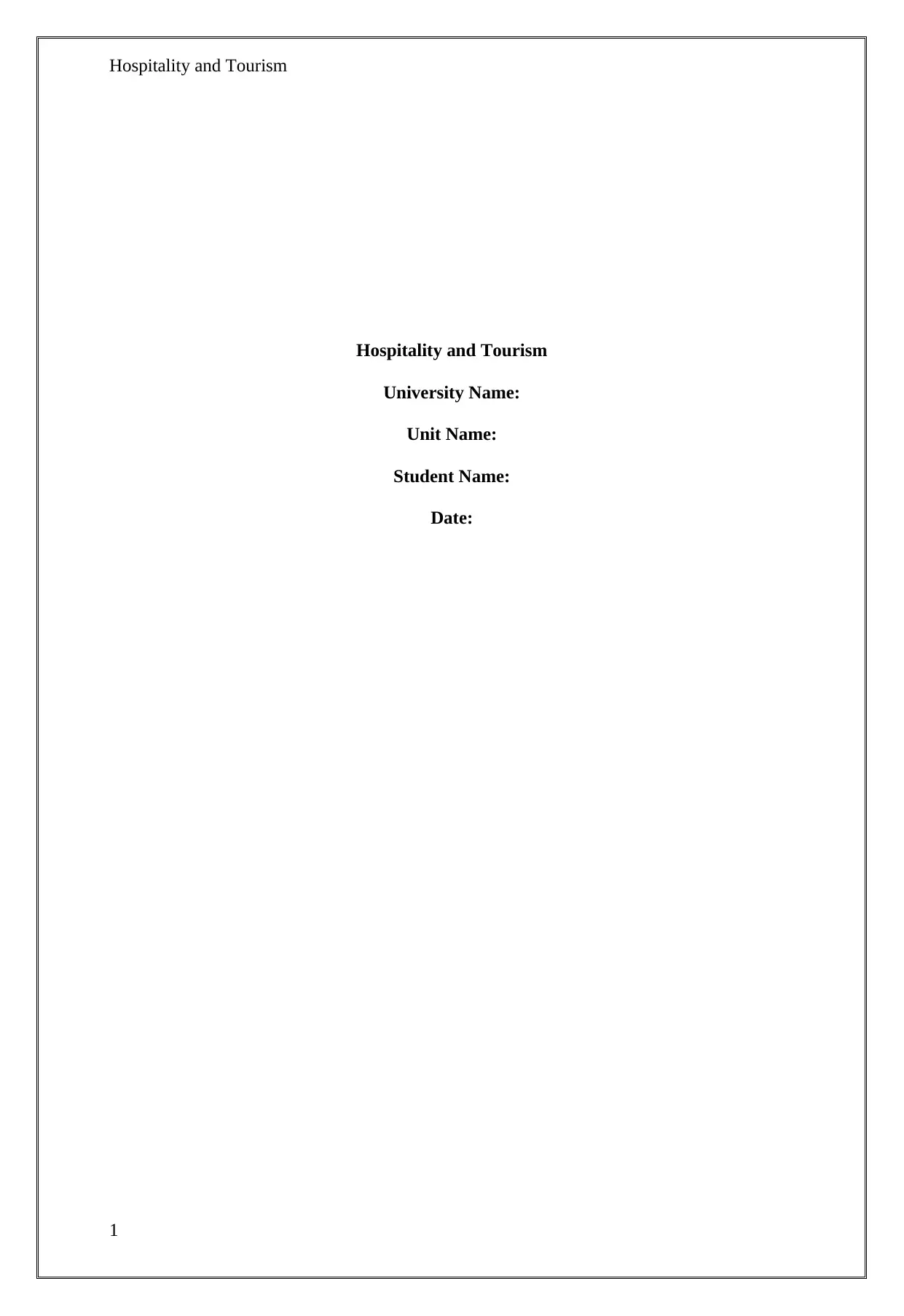
Hospitality and Tourism
Hospitality and Tourism
University Name:
Unit Name:
Student Name:
Date:
1
Hospitality and Tourism
University Name:
Unit Name:
Student Name:
Date:
1
Paraphrase This Document
Need a fresh take? Get an instant paraphrase of this document with our AI Paraphraser
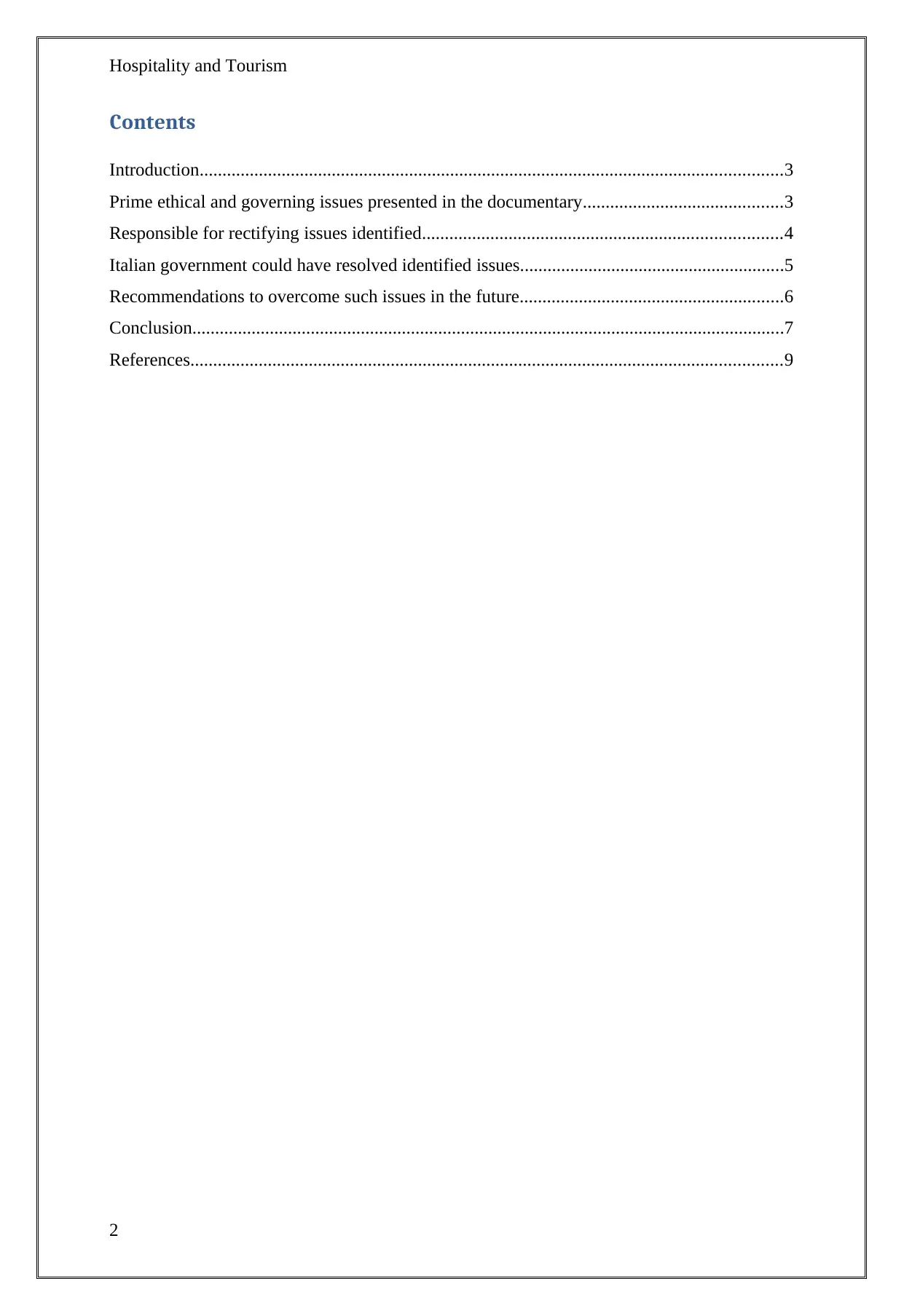
Hospitality and Tourism
Contents
Introduction................................................................................................................................3
Prime ethical and governing issues presented in the documentary............................................3
Responsible for rectifying issues identified...............................................................................4
Italian government could have resolved identified issues..........................................................5
Recommendations to overcome such issues in the future..........................................................6
Conclusion..................................................................................................................................7
References..................................................................................................................................9
2
Contents
Introduction................................................................................................................................3
Prime ethical and governing issues presented in the documentary............................................3
Responsible for rectifying issues identified...............................................................................4
Italian government could have resolved identified issues..........................................................5
Recommendations to overcome such issues in the future..........................................................6
Conclusion..................................................................................................................................7
References..................................................................................................................................9
2
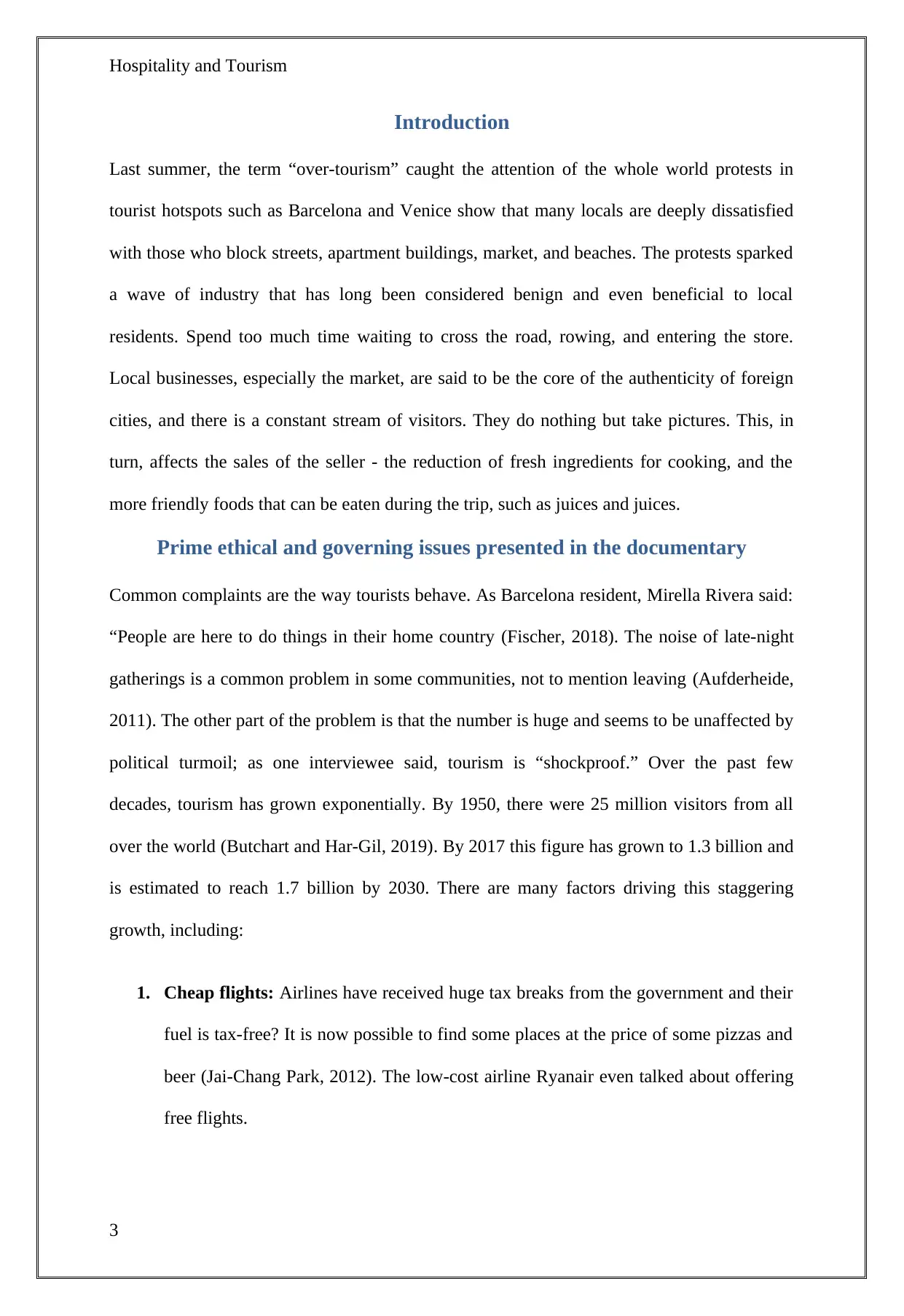
Hospitality and Tourism
Introduction
Last summer, the term “over-tourism” caught the attention of the whole world protests in
tourist hotspots such as Barcelona and Venice show that many locals are deeply dissatisfied
with those who block streets, apartment buildings, market, and beaches. The protests sparked
a wave of industry that has long been considered benign and even beneficial to local
residents. Spend too much time waiting to cross the road, rowing, and entering the store.
Local businesses, especially the market, are said to be the core of the authenticity of foreign
cities, and there is a constant stream of visitors. They do nothing but take pictures. This, in
turn, affects the sales of the seller - the reduction of fresh ingredients for cooking, and the
more friendly foods that can be eaten during the trip, such as juices and juices.
Prime ethical and governing issues presented in the documentary
Common complaints are the way tourists behave. As Barcelona resident, Mirella Rivera said:
“People are here to do things in their home country (Fischer, 2018). The noise of late-night
gatherings is a common problem in some communities, not to mention leaving (Aufderheide,
2011). The other part of the problem is that the number is huge and seems to be unaffected by
political turmoil; as one interviewee said, tourism is “shockproof.” Over the past few
decades, tourism has grown exponentially. By 1950, there were 25 million visitors from all
over the world (Butchart and Har-Gil, 2019). By 2017 this figure has grown to 1.3 billion and
is estimated to reach 1.7 billion by 2030. There are many factors driving this staggering
growth, including:
1. Cheap flights: Airlines have received huge tax breaks from the government and their
fuel is tax-free? It is now possible to find some places at the price of some pizzas and
beer (Jai-Chang Park, 2012). The low-cost airline Ryanair even talked about offering
free flights.
3
Introduction
Last summer, the term “over-tourism” caught the attention of the whole world protests in
tourist hotspots such as Barcelona and Venice show that many locals are deeply dissatisfied
with those who block streets, apartment buildings, market, and beaches. The protests sparked
a wave of industry that has long been considered benign and even beneficial to local
residents. Spend too much time waiting to cross the road, rowing, and entering the store.
Local businesses, especially the market, are said to be the core of the authenticity of foreign
cities, and there is a constant stream of visitors. They do nothing but take pictures. This, in
turn, affects the sales of the seller - the reduction of fresh ingredients for cooking, and the
more friendly foods that can be eaten during the trip, such as juices and juices.
Prime ethical and governing issues presented in the documentary
Common complaints are the way tourists behave. As Barcelona resident, Mirella Rivera said:
“People are here to do things in their home country (Fischer, 2018). The noise of late-night
gatherings is a common problem in some communities, not to mention leaving (Aufderheide,
2011). The other part of the problem is that the number is huge and seems to be unaffected by
political turmoil; as one interviewee said, tourism is “shockproof.” Over the past few
decades, tourism has grown exponentially. By 1950, there were 25 million visitors from all
over the world (Butchart and Har-Gil, 2019). By 2017 this figure has grown to 1.3 billion and
is estimated to reach 1.7 billion by 2030. There are many factors driving this staggering
growth, including:
1. Cheap flights: Airlines have received huge tax breaks from the government and their
fuel is tax-free? It is now possible to find some places at the price of some pizzas and
beer (Jai-Chang Park, 2012). The low-cost airline Ryanair even talked about offering
free flights.
3
⊘ This is a preview!⊘
Do you want full access?
Subscribe today to unlock all pages.

Trusted by 1+ million students worldwide
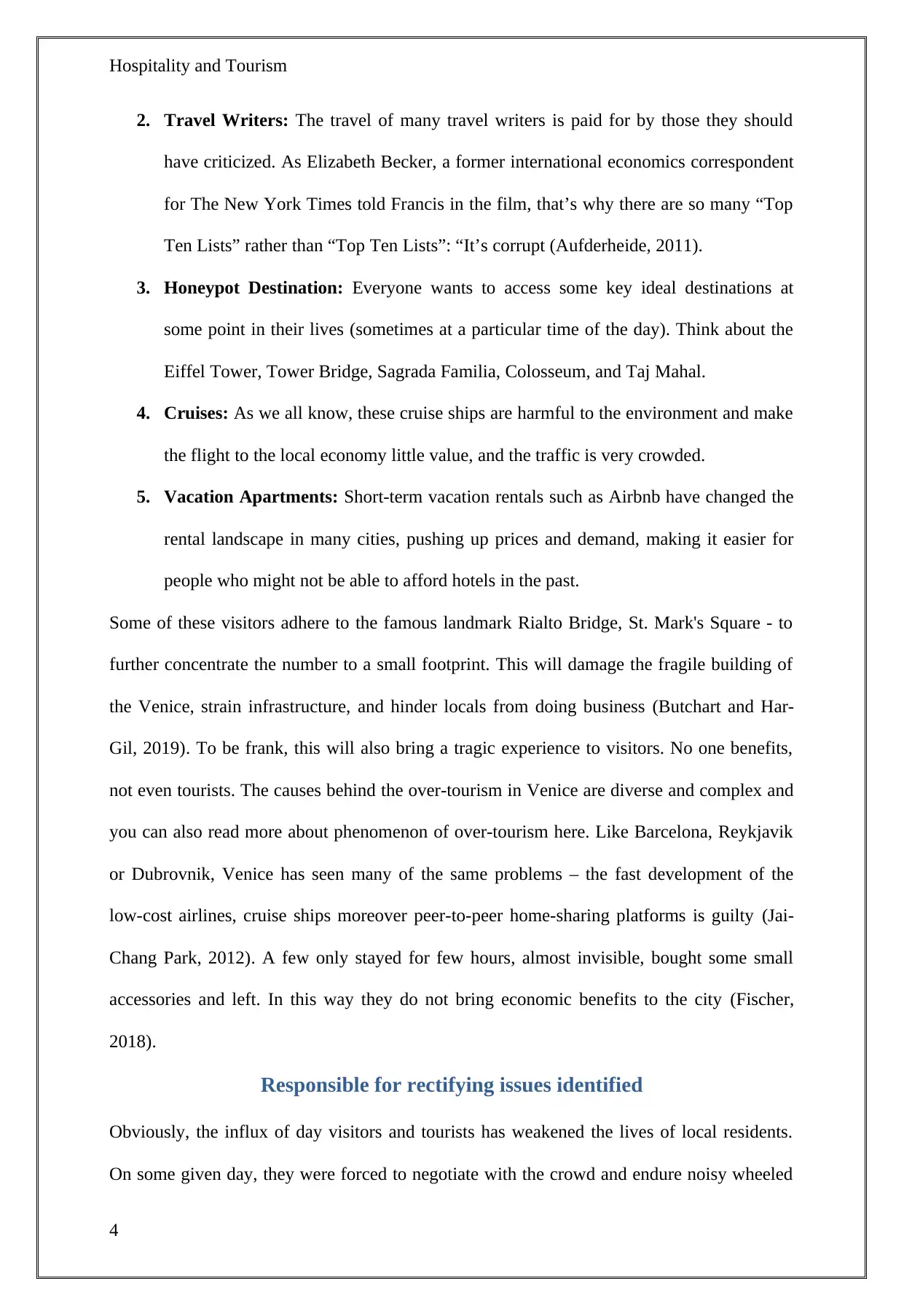
Hospitality and Tourism
2. Travel Writers: The travel of many travel writers is paid for by those they should
have criticized. As Elizabeth Becker, a former international economics correspondent
for The New York Times told Francis in the film, that’s why there are so many “Top
Ten Lists” rather than “Top Ten Lists”: “It’s corrupt (Aufderheide, 2011).
3. Honeypot Destination: Everyone wants to access some key ideal destinations at
some point in their lives (sometimes at a particular time of the day). Think about the
Eiffel Tower, Tower Bridge, Sagrada Familia, Colosseum, and Taj Mahal.
4. Cruises: As we all know, these cruise ships are harmful to the environment and make
the flight to the local economy little value, and the traffic is very crowded.
5. Vacation Apartments: Short-term vacation rentals such as Airbnb have changed the
rental landscape in many cities, pushing up prices and demand, making it easier for
people who might not be able to afford hotels in the past.
Some of these visitors adhere to the famous landmark Rialto Bridge, St. Mark's Square - to
further concentrate the number to a small footprint. This will damage the fragile building of
the Venice, strain infrastructure, and hinder locals from doing business (Butchart and Har-
Gil, 2019). To be frank, this will also bring a tragic experience to visitors. No one benefits,
not even tourists. The causes behind the over-tourism in Venice are diverse and complex and
you can also read more about phenomenon of over-tourism here. Like Barcelona, Reykjavik
or Dubrovnik, Venice has seen many of the same problems – the fast development of the
low-cost airlines, cruise ships moreover peer-to-peer home-sharing platforms is guilty (Jai-
Chang Park, 2012). A few only stayed for few hours, almost invisible, bought some small
accessories and left. In this way they do not bring economic benefits to the city (Fischer,
2018).
Responsible for rectifying issues identified
Obviously, the influx of day visitors and tourists has weakened the lives of local residents.
On some given day, they were forced to negotiate with the crowd and endure noisy wheeled
4
2. Travel Writers: The travel of many travel writers is paid for by those they should
have criticized. As Elizabeth Becker, a former international economics correspondent
for The New York Times told Francis in the film, that’s why there are so many “Top
Ten Lists” rather than “Top Ten Lists”: “It’s corrupt (Aufderheide, 2011).
3. Honeypot Destination: Everyone wants to access some key ideal destinations at
some point in their lives (sometimes at a particular time of the day). Think about the
Eiffel Tower, Tower Bridge, Sagrada Familia, Colosseum, and Taj Mahal.
4. Cruises: As we all know, these cruise ships are harmful to the environment and make
the flight to the local economy little value, and the traffic is very crowded.
5. Vacation Apartments: Short-term vacation rentals such as Airbnb have changed the
rental landscape in many cities, pushing up prices and demand, making it easier for
people who might not be able to afford hotels in the past.
Some of these visitors adhere to the famous landmark Rialto Bridge, St. Mark's Square - to
further concentrate the number to a small footprint. This will damage the fragile building of
the Venice, strain infrastructure, and hinder locals from doing business (Butchart and Har-
Gil, 2019). To be frank, this will also bring a tragic experience to visitors. No one benefits,
not even tourists. The causes behind the over-tourism in Venice are diverse and complex and
you can also read more about phenomenon of over-tourism here. Like Barcelona, Reykjavik
or Dubrovnik, Venice has seen many of the same problems – the fast development of the
low-cost airlines, cruise ships moreover peer-to-peer home-sharing platforms is guilty (Jai-
Chang Park, 2012). A few only stayed for few hours, almost invisible, bought some small
accessories and left. In this way they do not bring economic benefits to the city (Fischer,
2018).
Responsible for rectifying issues identified
Obviously, the influx of day visitors and tourists has weakened the lives of local residents.
On some given day, they were forced to negotiate with the crowd and endure noisy wheeled
4
Paraphrase This Document
Need a fresh take? Get an instant paraphrase of this document with our AI Paraphraser
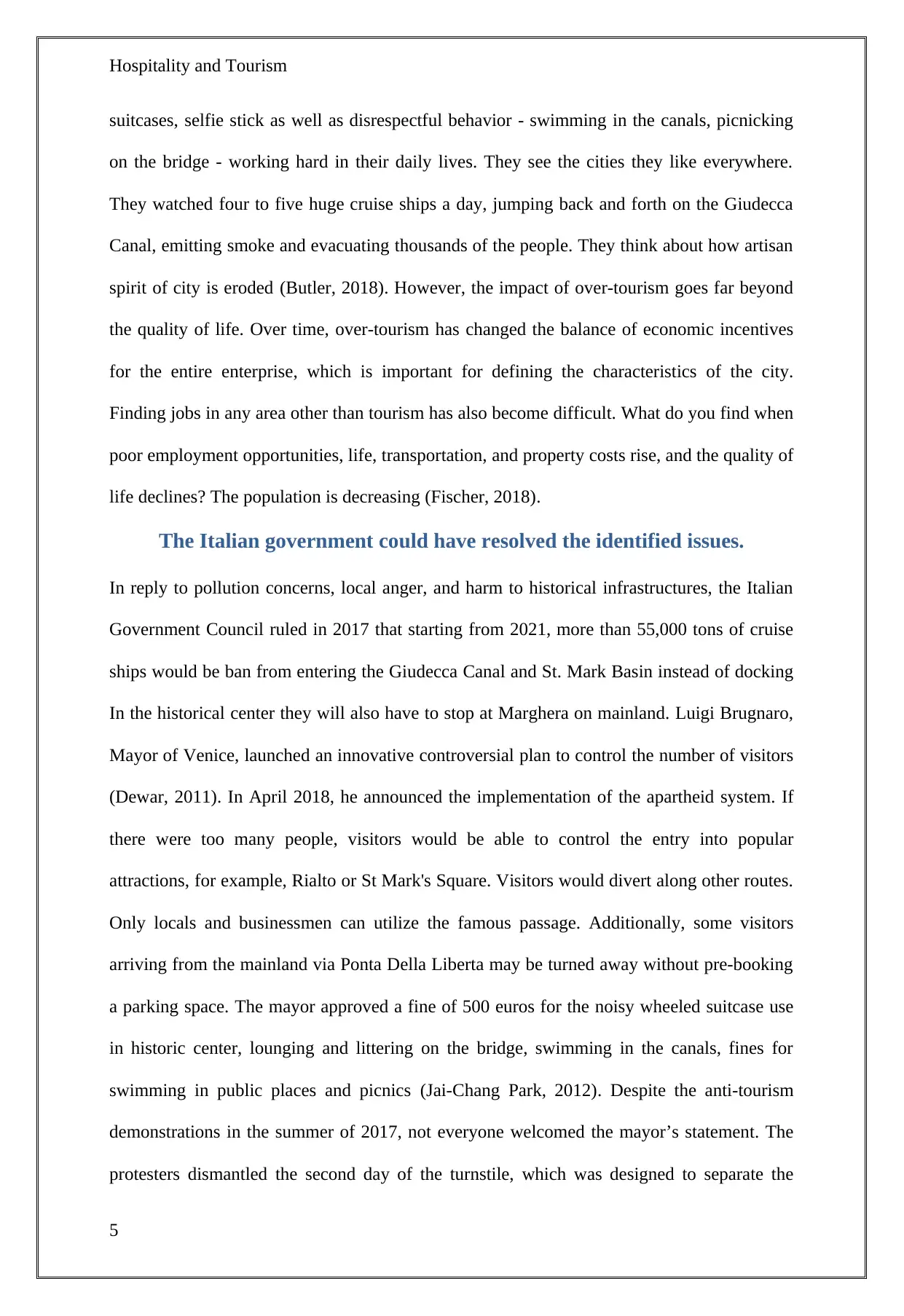
Hospitality and Tourism
suitcases, selfie stick as well as disrespectful behavior - swimming in the canals, picnicking
on the bridge - working hard in their daily lives. They see the cities they like everywhere.
They watched four to five huge cruise ships a day, jumping back and forth on the Giudecca
Canal, emitting smoke and evacuating thousands of the people. They think about how artisan
spirit of city is eroded (Butler, 2018). However, the impact of over-tourism goes far beyond
the quality of life. Over time, over-tourism has changed the balance of economic incentives
for the entire enterprise, which is important for defining the characteristics of the city.
Finding jobs in any area other than tourism has also become difficult. What do you find when
poor employment opportunities, life, transportation, and property costs rise, and the quality of
life declines? The population is decreasing (Fischer, 2018).
The Italian government could have resolved the identified issues.
In reply to pollution concerns, local anger, and harm to historical infrastructures, the Italian
Government Council ruled in 2017 that starting from 2021, more than 55,000 tons of cruise
ships would be ban from entering the Giudecca Canal and St. Mark Basin instead of docking
In the historical center they will also have to stop at Marghera on mainland. Luigi Brugnaro,
Mayor of Venice, launched an innovative controversial plan to control the number of visitors
(Dewar, 2011). In April 2018, he announced the implementation of the apartheid system. If
there were too many people, visitors would be able to control the entry into popular
attractions, for example, Rialto or St Mark's Square. Visitors would divert along other routes.
Only locals and businessmen can utilize the famous passage. Additionally, some visitors
arriving from the mainland via Ponta Della Liberta may be turned away without pre-booking
a parking space. The mayor approved a fine of 500 euros for the noisy wheeled suitcase use
in historic center, lounging and littering on the bridge, swimming in the canals, fines for
swimming in public places and picnics (Jai-Chang Park, 2012). Despite the anti-tourism
demonstrations in the summer of 2017, not everyone welcomed the mayor’s statement. The
protesters dismantled the second day of the turnstile, which was designed to separate the
5
suitcases, selfie stick as well as disrespectful behavior - swimming in the canals, picnicking
on the bridge - working hard in their daily lives. They see the cities they like everywhere.
They watched four to five huge cruise ships a day, jumping back and forth on the Giudecca
Canal, emitting smoke and evacuating thousands of the people. They think about how artisan
spirit of city is eroded (Butler, 2018). However, the impact of over-tourism goes far beyond
the quality of life. Over time, over-tourism has changed the balance of economic incentives
for the entire enterprise, which is important for defining the characteristics of the city.
Finding jobs in any area other than tourism has also become difficult. What do you find when
poor employment opportunities, life, transportation, and property costs rise, and the quality of
life declines? The population is decreasing (Fischer, 2018).
The Italian government could have resolved the identified issues.
In reply to pollution concerns, local anger, and harm to historical infrastructures, the Italian
Government Council ruled in 2017 that starting from 2021, more than 55,000 tons of cruise
ships would be ban from entering the Giudecca Canal and St. Mark Basin instead of docking
In the historical center they will also have to stop at Marghera on mainland. Luigi Brugnaro,
Mayor of Venice, launched an innovative controversial plan to control the number of visitors
(Dewar, 2011). In April 2018, he announced the implementation of the apartheid system. If
there were too many people, visitors would be able to control the entry into popular
attractions, for example, Rialto or St Mark's Square. Visitors would divert along other routes.
Only locals and businessmen can utilize the famous passage. Additionally, some visitors
arriving from the mainland via Ponta Della Liberta may be turned away without pre-booking
a parking space. The mayor approved a fine of 500 euros for the noisy wheeled suitcase use
in historic center, lounging and littering on the bridge, swimming in the canals, fines for
swimming in public places and picnics (Jai-Chang Park, 2012). Despite the anti-tourism
demonstrations in the summer of 2017, not everyone welcomed the mayor’s statement. The
protesters dismantled the second day of the turnstile, which was designed to separate the
5
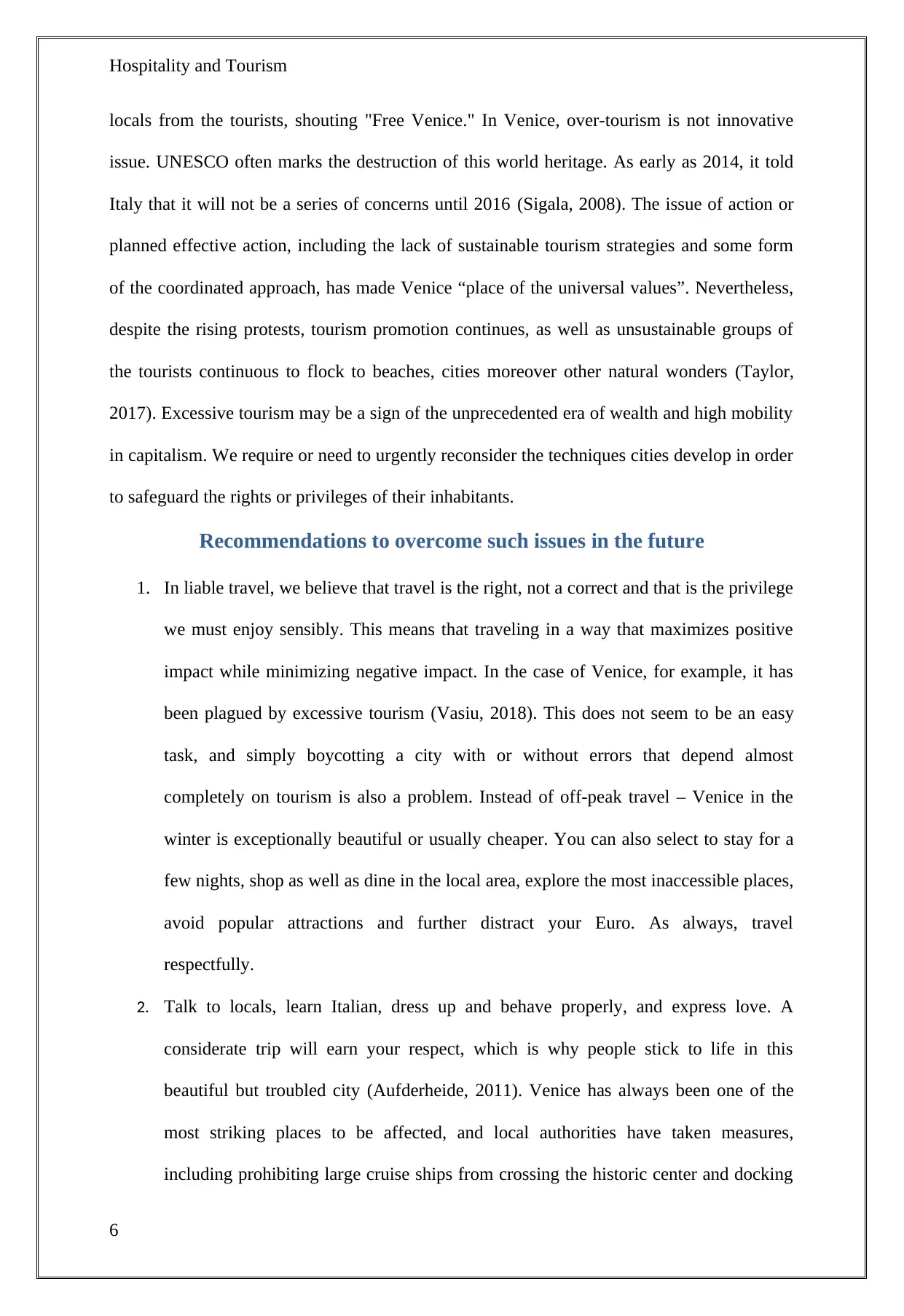
Hospitality and Tourism
locals from the tourists, shouting "Free Venice." In Venice, over-tourism is not innovative
issue. UNESCO often marks the destruction of this world heritage. As early as 2014, it told
Italy that it will not be a series of concerns until 2016 (Sigala, 2008). The issue of action or
planned effective action, including the lack of sustainable tourism strategies and some form
of the coordinated approach, has made Venice “place of the universal values”. Nevertheless,
despite the rising protests, tourism promotion continues, as well as unsustainable groups of
the tourists continuous to flock to beaches, cities moreover other natural wonders (Taylor,
2017). Excessive tourism may be a sign of the unprecedented era of wealth and high mobility
in capitalism. We require or need to urgently reconsider the techniques cities develop in order
to safeguard the rights or privileges of their inhabitants.
Recommendations to overcome such issues in the future
1. In liable travel, we believe that travel is the right, not a correct and that is the privilege
we must enjoy sensibly. This means that traveling in a way that maximizes positive
impact while minimizing negative impact. In the case of Venice, for example, it has
been plagued by excessive tourism (Vasiu, 2018). This does not seem to be an easy
task, and simply boycotting a city with or without errors that depend almost
completely on tourism is also a problem. Instead of off-peak travel – Venice in the
winter is exceptionally beautiful or usually cheaper. You can also select to stay for a
few nights, shop as well as dine in the local area, explore the most inaccessible places,
avoid popular attractions and further distract your Euro. As always, travel
respectfully.
2. Talk to locals, learn Italian, dress up and behave properly, and express love. A
considerate trip will earn your respect, which is why people stick to life in this
beautiful but troubled city (Aufderheide, 2011). Venice has always been one of the
most striking places to be affected, and local authorities have taken measures,
including prohibiting large cruise ships from crossing the historic center and docking
6
locals from the tourists, shouting "Free Venice." In Venice, over-tourism is not innovative
issue. UNESCO often marks the destruction of this world heritage. As early as 2014, it told
Italy that it will not be a series of concerns until 2016 (Sigala, 2008). The issue of action or
planned effective action, including the lack of sustainable tourism strategies and some form
of the coordinated approach, has made Venice “place of the universal values”. Nevertheless,
despite the rising protests, tourism promotion continues, as well as unsustainable groups of
the tourists continuous to flock to beaches, cities moreover other natural wonders (Taylor,
2017). Excessive tourism may be a sign of the unprecedented era of wealth and high mobility
in capitalism. We require or need to urgently reconsider the techniques cities develop in order
to safeguard the rights or privileges of their inhabitants.
Recommendations to overcome such issues in the future
1. In liable travel, we believe that travel is the right, not a correct and that is the privilege
we must enjoy sensibly. This means that traveling in a way that maximizes positive
impact while minimizing negative impact. In the case of Venice, for example, it has
been plagued by excessive tourism (Vasiu, 2018). This does not seem to be an easy
task, and simply boycotting a city with or without errors that depend almost
completely on tourism is also a problem. Instead of off-peak travel – Venice in the
winter is exceptionally beautiful or usually cheaper. You can also select to stay for a
few nights, shop as well as dine in the local area, explore the most inaccessible places,
avoid popular attractions and further distract your Euro. As always, travel
respectfully.
2. Talk to locals, learn Italian, dress up and behave properly, and express love. A
considerate trip will earn your respect, which is why people stick to life in this
beautiful but troubled city (Aufderheide, 2011). Venice has always been one of the
most striking places to be affected, and local authorities have taken measures,
including prohibiting large cruise ships from crossing the historic center and docking
6
⊘ This is a preview!⊘
Do you want full access?
Subscribe today to unlock all pages.

Trusted by 1+ million students worldwide
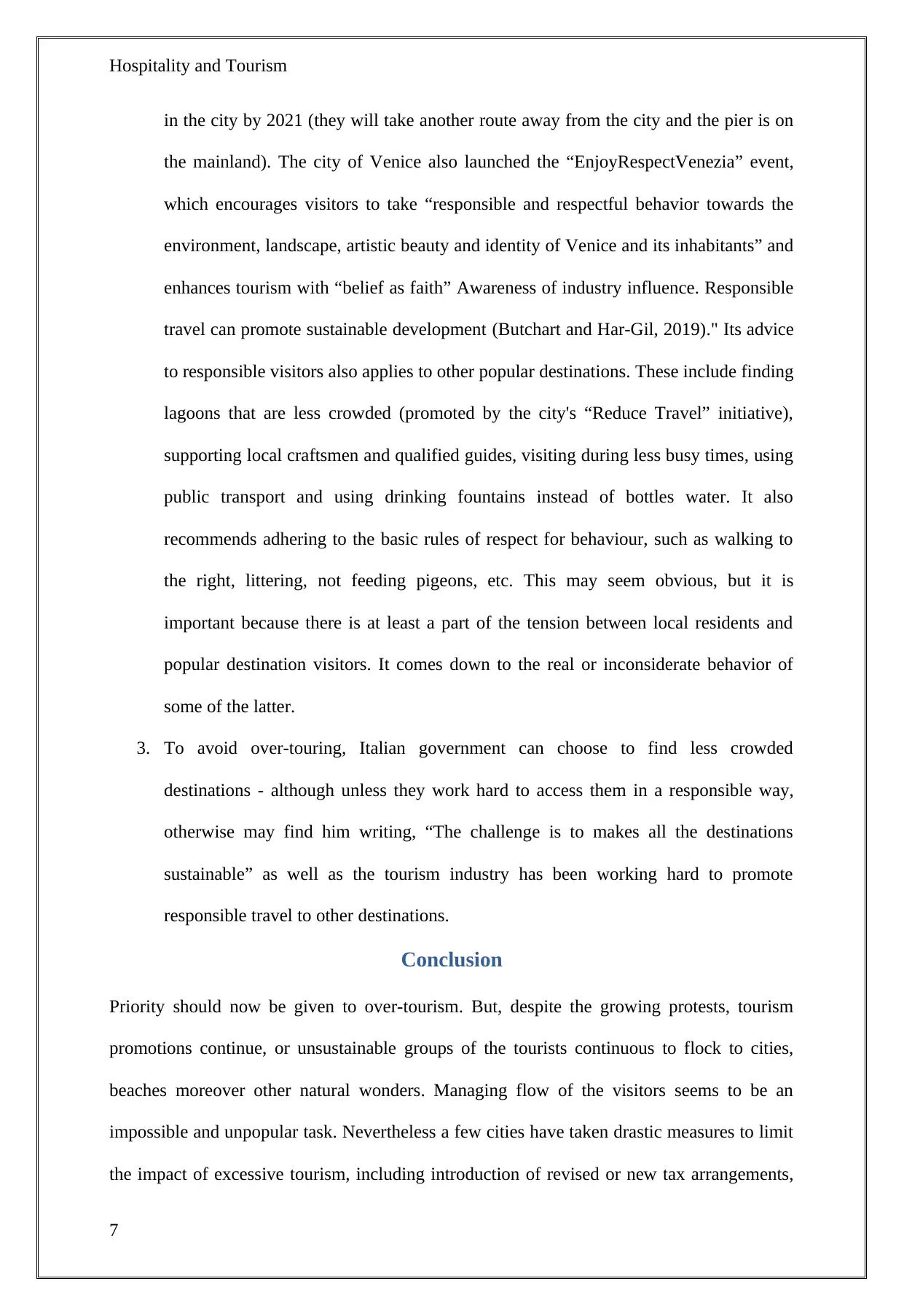
Hospitality and Tourism
in the city by 2021 (they will take another route away from the city and the pier is on
the mainland). The city of Venice also launched the “EnjoyRespectVenezia” event,
which encourages visitors to take “responsible and respectful behavior towards the
environment, landscape, artistic beauty and identity of Venice and its inhabitants” and
enhances tourism with “belief as faith” Awareness of industry influence. Responsible
travel can promote sustainable development (Butchart and Har-Gil, 2019)." Its advice
to responsible visitors also applies to other popular destinations. These include finding
lagoons that are less crowded (promoted by the city's “Reduce Travel” initiative),
supporting local craftsmen and qualified guides, visiting during less busy times, using
public transport and using drinking fountains instead of bottles water. It also
recommends adhering to the basic rules of respect for behaviour, such as walking to
the right, littering, not feeding pigeons, etc. This may seem obvious, but it is
important because there is at least a part of the tension between local residents and
popular destination visitors. It comes down to the real or inconsiderate behavior of
some of the latter.
3. To avoid over-touring, Italian government can choose to find less crowded
destinations - although unless they work hard to access them in a responsible way,
otherwise may find him writing, “The challenge is to makes all the destinations
sustainable” as well as the tourism industry has been working hard to promote
responsible travel to other destinations.
Conclusion
Priority should now be given to over-tourism. But, despite the growing protests, tourism
promotions continue, or unsustainable groups of the tourists continuous to flock to cities,
beaches moreover other natural wonders. Managing flow of the visitors seems to be an
impossible and unpopular task. Nevertheless a few cities have taken drastic measures to limit
the impact of excessive tourism, including introduction of revised or new tax arrangements,
7
in the city by 2021 (they will take another route away from the city and the pier is on
the mainland). The city of Venice also launched the “EnjoyRespectVenezia” event,
which encourages visitors to take “responsible and respectful behavior towards the
environment, landscape, artistic beauty and identity of Venice and its inhabitants” and
enhances tourism with “belief as faith” Awareness of industry influence. Responsible
travel can promote sustainable development (Butchart and Har-Gil, 2019)." Its advice
to responsible visitors also applies to other popular destinations. These include finding
lagoons that are less crowded (promoted by the city's “Reduce Travel” initiative),
supporting local craftsmen and qualified guides, visiting during less busy times, using
public transport and using drinking fountains instead of bottles water. It also
recommends adhering to the basic rules of respect for behaviour, such as walking to
the right, littering, not feeding pigeons, etc. This may seem obvious, but it is
important because there is at least a part of the tension between local residents and
popular destination visitors. It comes down to the real or inconsiderate behavior of
some of the latter.
3. To avoid over-touring, Italian government can choose to find less crowded
destinations - although unless they work hard to access them in a responsible way,
otherwise may find him writing, “The challenge is to makes all the destinations
sustainable” as well as the tourism industry has been working hard to promote
responsible travel to other destinations.
Conclusion
Priority should now be given to over-tourism. But, despite the growing protests, tourism
promotions continue, or unsustainable groups of the tourists continuous to flock to cities,
beaches moreover other natural wonders. Managing flow of the visitors seems to be an
impossible and unpopular task. Nevertheless a few cities have taken drastic measures to limit
the impact of excessive tourism, including introduction of revised or new tax arrangements,
7
Paraphrase This Document
Need a fresh take? Get an instant paraphrase of this document with our AI Paraphraser
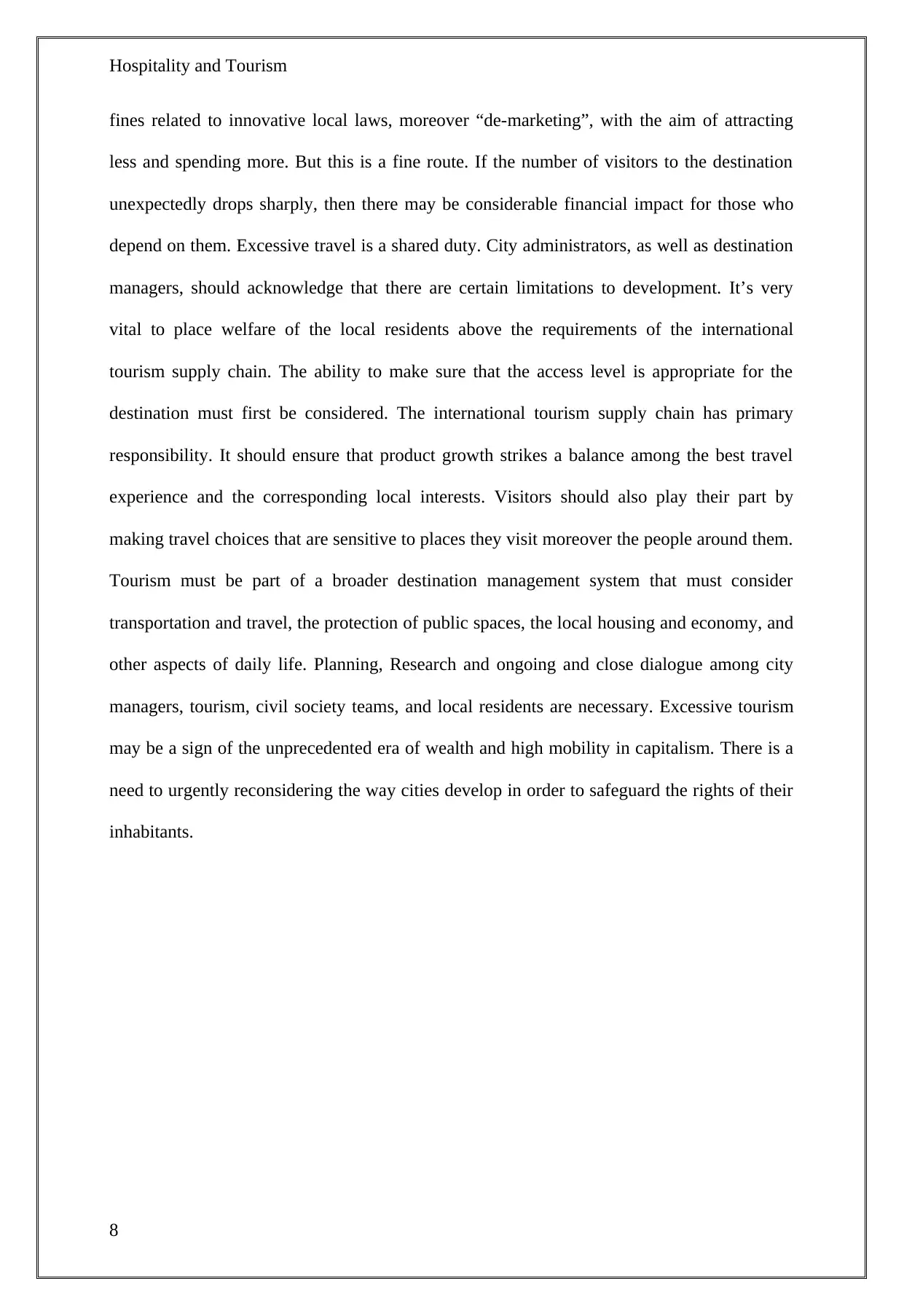
Hospitality and Tourism
fines related to innovative local laws, moreover “de-marketing”, with the aim of attracting
less and spending more. But this is a fine route. If the number of visitors to the destination
unexpectedly drops sharply, then there may be considerable financial impact for those who
depend on them. Excessive travel is a shared duty. City administrators, as well as destination
managers, should acknowledge that there are certain limitations to development. It’s very
vital to place welfare of the local residents above the requirements of the international
tourism supply chain. The ability to make sure that the access level is appropriate for the
destination must first be considered. The international tourism supply chain has primary
responsibility. It should ensure that product growth strikes a balance among the best travel
experience and the corresponding local interests. Visitors should also play their part by
making travel choices that are sensitive to places they visit moreover the people around them.
Tourism must be part of a broader destination management system that must consider
transportation and travel, the protection of public spaces, the local housing and economy, and
other aspects of daily life. Planning, Research and ongoing and close dialogue among city
managers, tourism, civil society teams, and local residents are necessary. Excessive tourism
may be a sign of the unprecedented era of wealth and high mobility in capitalism. There is a
need to urgently reconsidering the way cities develop in order to safeguard the rights of their
inhabitants.
8
fines related to innovative local laws, moreover “de-marketing”, with the aim of attracting
less and spending more. But this is a fine route. If the number of visitors to the destination
unexpectedly drops sharply, then there may be considerable financial impact for those who
depend on them. Excessive travel is a shared duty. City administrators, as well as destination
managers, should acknowledge that there are certain limitations to development. It’s very
vital to place welfare of the local residents above the requirements of the international
tourism supply chain. The ability to make sure that the access level is appropriate for the
destination must first be considered. The international tourism supply chain has primary
responsibility. It should ensure that product growth strikes a balance among the best travel
experience and the corresponding local interests. Visitors should also play their part by
making travel choices that are sensitive to places they visit moreover the people around them.
Tourism must be part of a broader destination management system that must consider
transportation and travel, the protection of public spaces, the local housing and economy, and
other aspects of daily life. Planning, Research and ongoing and close dialogue among city
managers, tourism, civil society teams, and local residents are necessary. Excessive tourism
may be a sign of the unprecedented era of wealth and high mobility in capitalism. There is a
need to urgently reconsidering the way cities develop in order to safeguard the rights of their
inhabitants.
8
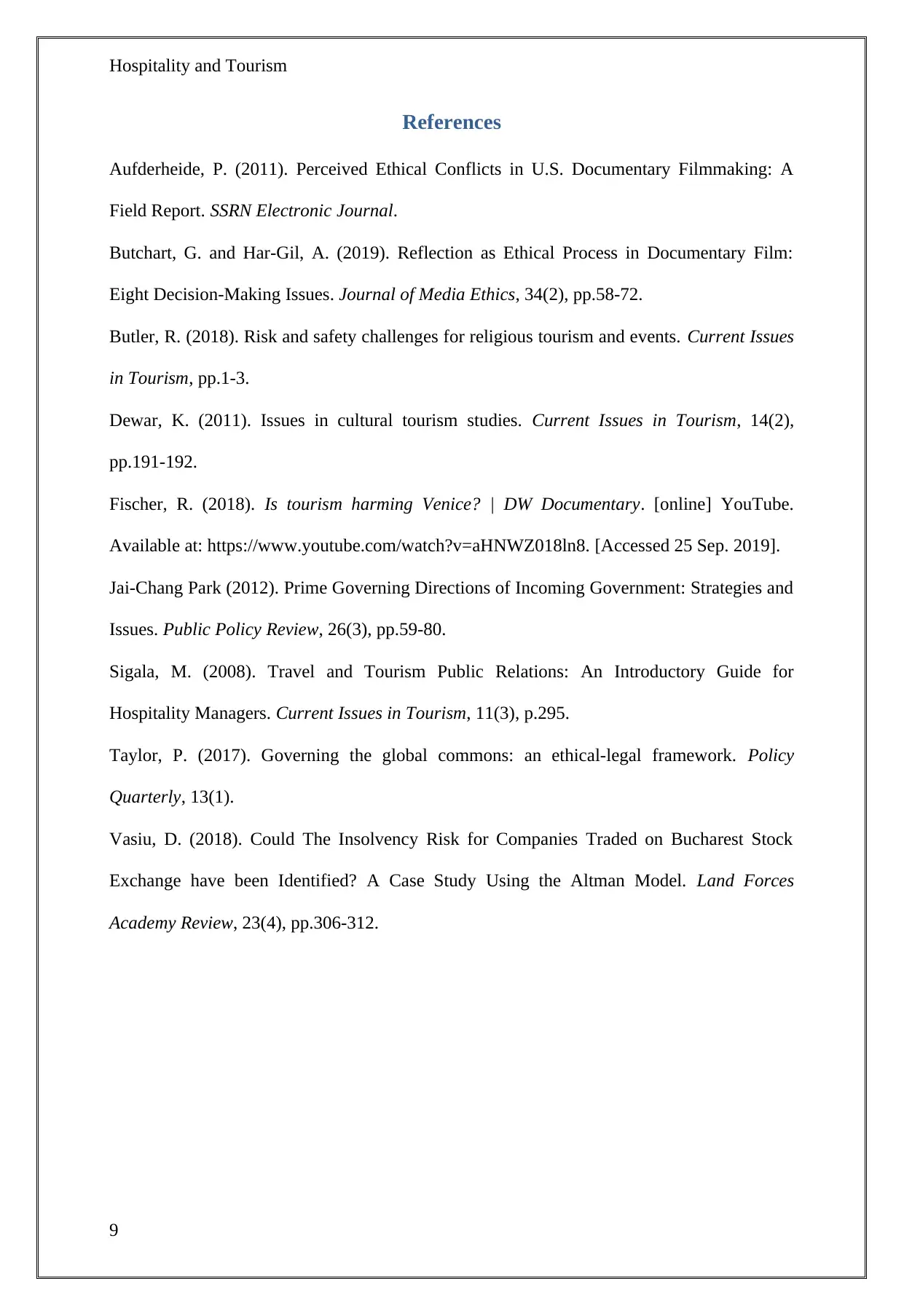
Hospitality and Tourism
References
Aufderheide, P. (2011). Perceived Ethical Conflicts in U.S. Documentary Filmmaking: A
Field Report. SSRN Electronic Journal.
Butchart, G. and Har-Gil, A. (2019). Reflection as Ethical Process in Documentary Film:
Eight Decision-Making Issues. Journal of Media Ethics, 34(2), pp.58-72.
Butler, R. (2018). Risk and safety challenges for religious tourism and events. Current Issues
in Tourism, pp.1-3.
Dewar, K. (2011). Issues in cultural tourism studies. Current Issues in Tourism, 14(2),
pp.191-192.
Fischer, R. (2018). Is tourism harming Venice? | DW Documentary. [online] YouTube.
Available at: https://www.youtube.com/watch?v=aHNWZ018ln8. [Accessed 25 Sep. 2019].
Jai-Chang Park (2012). Prime Governing Directions of Incoming Government: Strategies and
Issues. Public Policy Review, 26(3), pp.59-80.
Sigala, M. (2008). Travel and Tourism Public Relations: An Introductory Guide for
Hospitality Managers. Current Issues in Tourism, 11(3), p.295.
Taylor, P. (2017). Governing the global commons: an ethical-legal framework. Policy
Quarterly, 13(1).
Vasiu, D. (2018). Could The Insolvency Risk for Companies Traded on Bucharest Stock
Exchange have been Identified? A Case Study Using the Altman Model. Land Forces
Academy Review, 23(4), pp.306-312.
9
References
Aufderheide, P. (2011). Perceived Ethical Conflicts in U.S. Documentary Filmmaking: A
Field Report. SSRN Electronic Journal.
Butchart, G. and Har-Gil, A. (2019). Reflection as Ethical Process in Documentary Film:
Eight Decision-Making Issues. Journal of Media Ethics, 34(2), pp.58-72.
Butler, R. (2018). Risk and safety challenges for religious tourism and events. Current Issues
in Tourism, pp.1-3.
Dewar, K. (2011). Issues in cultural tourism studies. Current Issues in Tourism, 14(2),
pp.191-192.
Fischer, R. (2018). Is tourism harming Venice? | DW Documentary. [online] YouTube.
Available at: https://www.youtube.com/watch?v=aHNWZ018ln8. [Accessed 25 Sep. 2019].
Jai-Chang Park (2012). Prime Governing Directions of Incoming Government: Strategies and
Issues. Public Policy Review, 26(3), pp.59-80.
Sigala, M. (2008). Travel and Tourism Public Relations: An Introductory Guide for
Hospitality Managers. Current Issues in Tourism, 11(3), p.295.
Taylor, P. (2017). Governing the global commons: an ethical-legal framework. Policy
Quarterly, 13(1).
Vasiu, D. (2018). Could The Insolvency Risk for Companies Traded on Bucharest Stock
Exchange have been Identified? A Case Study Using the Altman Model. Land Forces
Academy Review, 23(4), pp.306-312.
9
⊘ This is a preview!⊘
Do you want full access?
Subscribe today to unlock all pages.

Trusted by 1+ million students worldwide
1 out of 9
Your All-in-One AI-Powered Toolkit for Academic Success.
+13062052269
info@desklib.com
Available 24*7 on WhatsApp / Email
![[object Object]](/_next/static/media/star-bottom.7253800d.svg)
Unlock your academic potential
Copyright © 2020–2025 A2Z Services. All Rights Reserved. Developed and managed by ZUCOL.
